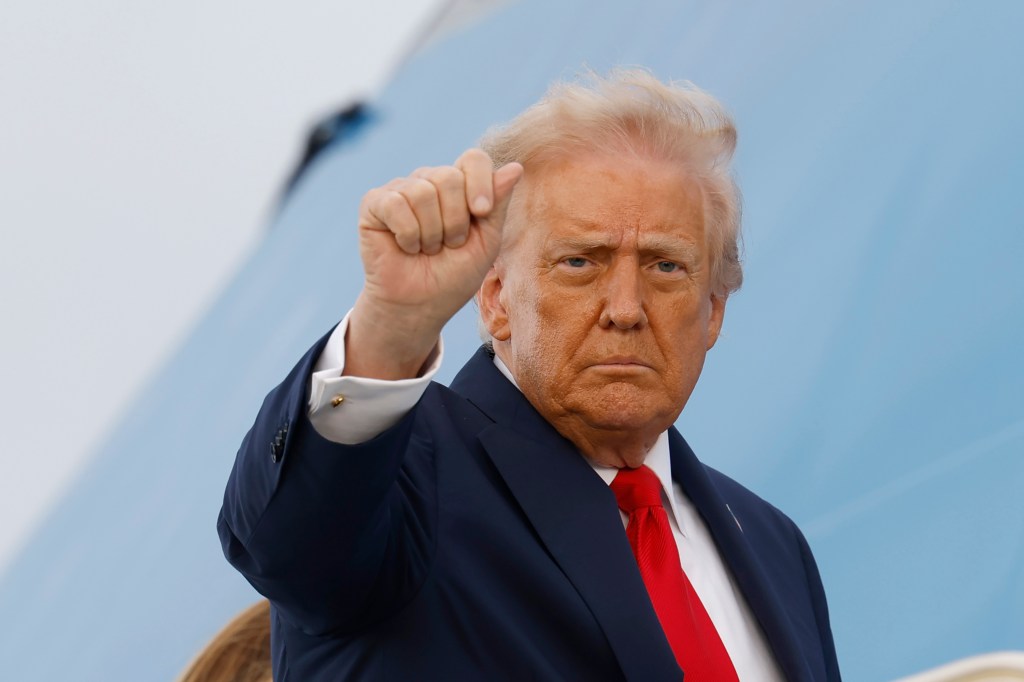In the wake of ABC’s decision to sideline Jimmy Kimmel following a threat from the FCC, Donald Trump suggested that the agency should weigh late-night criticism as broadcasters seek licensing renewals.
As he talked to reporters on Air Force One on his return to the U.S. from Great Britain, Trump said that the late-night hosts’ criticisms is “something that should be talked about for licensing.”
Trump told reporters, “When you have a network, and they have evening shows, and all they do is hit Trump. If you go back — I guess they haven’t had a conservative on in years or something — all they do is hit Trump. They’re licensed. They’re not allowed to do that. They’re an arm of the Democrat party.”
The president seemed to be suggesting a return to the Fairness Doctrine. That required that broadcasters provide a mix of points of view on issues of major importance. But that requirement was abandoned in 1987, during the Reagan administration.
The lifting of the Fairness Doctrine was credited with ushering in a new era of partisan talk radio, led by conservative host Rush Limbaugh.
On Wednesday, Trump’s FCC chairman, Brendan Carr, threatened to take action against ABC and its stations over a remark that Kimmel made in his monologue on Monday.
Kimmel said, “We had some new lows over the weekend with the MAGA gang desperately trying to characterize this kid who murdered Charlie Kirk as anything other than one of them and with everything they can to score political points from it.”
Carr said on Benny Johnson’s podcast, “We can do this the easy way or the hard way. These companies can find ways to change conduct, to take action, frankly, on Kimmel, or there’s going to be additional work for the FCC ahead.”
Hours later, Nexstar, the largest station group in the country, said that it was dropping Kimmel’s show from is ABC affiliates for the “foreseeable future.” Sinclair Broadcast Group followed later. Shortly after Nexstar’s announcement, ABC said that it was pulling Kimmel’s show indefinitely.
In interviews, Carr has maintained that broadcasters have an obligation to operate in the public interest.
On Hannity on Thursday, he said, “We at the FCC are going to enforce the public interest obligation. If there’s broadcasters out there that don’t like it, they can turn their license into the FCC. But that’s our job. And again, we’re making some progress now.”
But the FCC says that it has limited authority over program content, and Carr himself has decried government efforts to censor speech. He wrote on Twitter in 2019, “The FCC does not have a roving mandate to police speech in the name of the ‘public interest.’”
Anna Gomez, the sole Democrat on the FCC, suggested in a statement on Thursday that Carr was using the threat of FCC action to extract concessions, even though he does not have legal standing to sanction broadcasters on what Kimmel said.
Gomez said, “This FCC does not have the authority, the ability, or the constitutional right to police content or punish broadcasters for speech the government dislikes. If it were to take the unprecedented step of trying to revoke broadcast licenses, which are held by local stations rather than national networks, it would run headlong into the First Amendment and fail in court on both the facts and the law. But even the threat to revoke a license is no small matter. It poses an existential risk to a broadcaster, which by definition cannot exist without its license. That makes billion-dollar companies with pending business before the agency all the more vulnerable to pressure to bend to the government’s ideological demands.”
The post Donald Trump Says Late Night Hosts’ Biting Jokes Should Factor Into FCC Licensing Decisions appeared first on Deadline.




